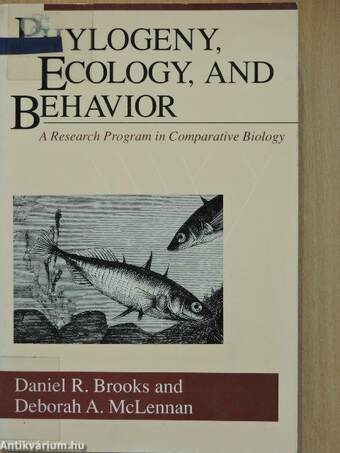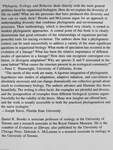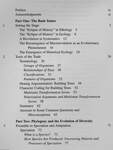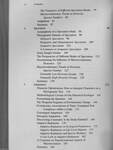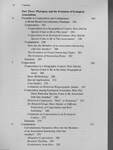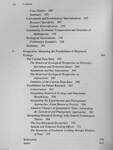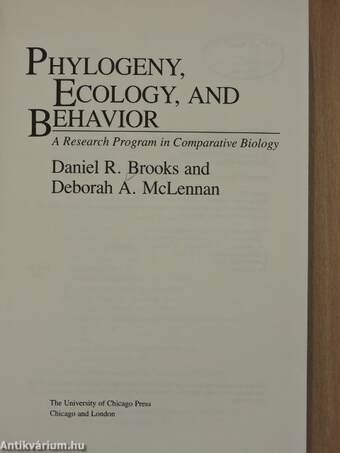1.062.515
kiadvánnyal nyújtjuk Magyarország legnagyobb antikvár könyv-kínálatát

VISSZA
A TETEJÉRE
JAVASLATOKÉszre-
vételek
Phylogeny, Ecology, and Behavior
A Research Program in Comparative Biology
| Kiadó: | The University of Chicago Press |
|---|---|
| Kiadás helye: | Chicago |
| Kiadás éve: | |
| Kötés típusa: | Ragasztott papírkötés |
| Oldalszám: | 434 oldal |
| Sorozatcím: | |
| Kötetszám: | |
| Nyelv: | Angol |
| Méret: | 23 cm x 15 cm |
| ISBN: | 0-226-07572-9 |
| Megjegyzés: | Fekete-fehér illusztrációkkal. |
naponta értesítjük a beérkező friss
kiadványokról
naponta értesítjük a beérkező friss
kiadványokról
Fülszöveg
"Phytogeny, Ecology^ and Behavior deals directly with the most general
problem faced by organismal biologists: How do we explain the diversity of
life on earth? What are the processes that have produced this diversity and
how can we study them? Brooks and McLennan argue for an approach to
understanding diversity that combines phylogenetic and environmental
processes. Their methodology, which is described very clearly, is rooted in
modern phylogenetic approaches. A central point of this book is to clearly
demonstrate that good estimates of the relationships of organisms provide
powerful tools for tracing evolution. The authors show that a phylogenetic
context can be used successfully to address a variety of the most significant
questions in organismal biology: What mode of speciation has occurred in the
evolution of a lineage? What has been the relative importance of different
modes of speciation in a lineage? How does one recognize convergent evo-
lution, or divergent... Tovább
Fülszöveg
"Phytogeny, Ecology^ and Behavior deals directly with the most general
problem faced by organismal biologists: How do we explain the diversity of
life on earth? What are the processes that have produced this diversity and
how can we study them? Brooks and McLennan argue for an approach to
understanding diversity that combines phylogenetic and environmental
processes. Their methodology, which is described very clearly, is rooted in
modern phylogenetic approaches. A central point of this book is to clearly
demonstrate that good estimates of the relationships of organisms provide
powerful tools for tracing evolution. The authors show that a phylogenetic
context can be used successfully to address a variety of the most significant
questions in organismal biology: What mode of speciation has occurred in the
evolution of a lineage? What has been the relative importance of different
modes of speciation in a lineage? How does one recognize convergent evo-
lution, or divergent adaptation? Why are species X and Y associated in the
same habitat? What causes the structure present in an ecological community?"
—Peter C. Wainwright, University of California, Irvine
"The merits of this work are many. A rigorous integration of phylogenetic
hypotheses into studies of adaptation, adaptive radiation, and coevolution is
absolutely necessary and can change dramatically our collective gestalt about
much in evolutionary biology. The authors advance and illustrate this thesis
beautifully. The writing is often lucid, the examples are plentiful and diverse,
and the juxtaposition of examples from different biological systems argues
forcefully for the validity of the thesis. Many new insights are offered here,
and the work is usually accessible to both the practiced phylogeneticist and
the naive ecologist."
—Joseph Travis, Florida State University
Daniel R. Brooks is associate professor of zoology at the University of
Toronto and a research associate at the Royal Ontario Museum. He is the
coauthor of Evolution as Entropy, also published by the University of
Chicago Press. Deborah A. McLennan is a research associate in zoology at
the University of Toronto, Vissza
Témakörök
- Idegennyelv > Idegennyelvű könyvek > Angol > Természettudományok > Biológia
- Természettudomány > Biológia > Biológia, általános > Élővilág
- Természettudomány > Biológia > Biológia, általános > Idegennyelvű
- Természettudomány > Biológia > Ökológia, környezetvédelem > Ökológia > Általában
- Természettudomány > Biológia > Ökológia, környezetvédelem > Idegennyelvű
- Természettudomány > Biológia > Fajfejlődés > Evolúció (származástan)
- Természettudomány > Biológia > Fajfejlődés > Idegennyelvű
Megvásárolható példányok
Nincs megvásárolható példány
A könyv összes megrendelhető példánya elfogyott. Ha kívánja, előjegyezheti a könyvet, és amint a könyv egy újabb példánya elérhető lesz, értesítjük.



